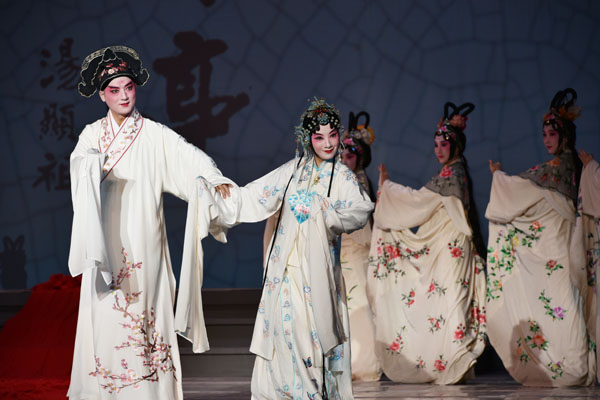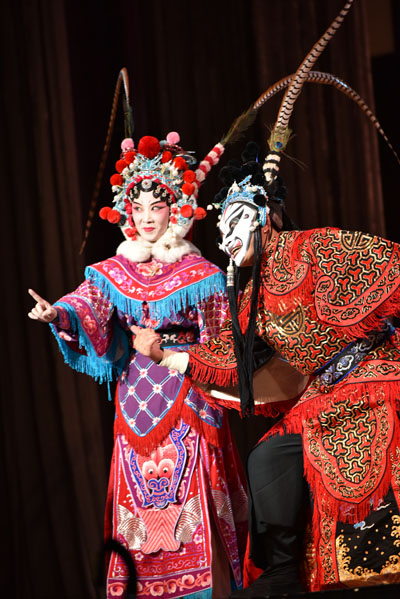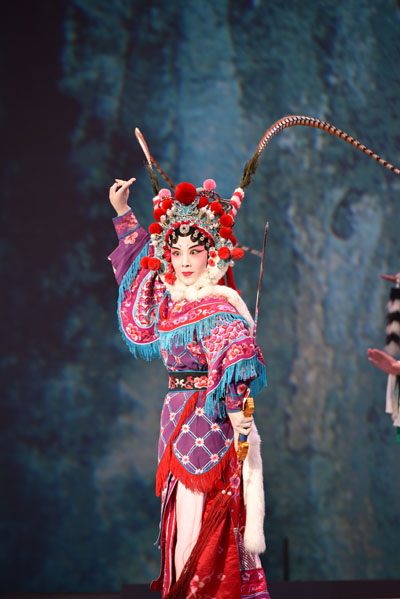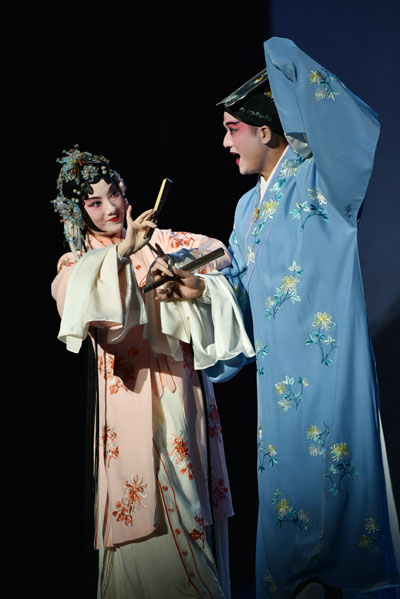Kunqu-a first timer's guide to the Chinese opera
Updated: 2016-10-04 16:38
By ANGUS McNEICE(China Daily UK)
|
|||||||||
 |
|
Cast members of The Peony Pavilion from the Suzhou Opera Theatre take to the stage for a performance at London's Troxy Theatre. [Photo by Wang Zhiyong/For China Daily] |
Tang Xianzu's most enduring love story The Peony Pavilion offers Western audiences a dazzling blend of song, dance, ballet, acrobatics, drama, fashion and music, and for this Kunqu Opera novice it was an unforgettable night out.
Kunqu is the root from which various disciplines of Chinese opera stem. The Suzhou Opera Theatre brought its production to the UK to commemorate the 400th year since Tang's death-an anniversary that the Chinese playwright shares with William Shakespeare.
Further parallels can be made between The Peony Pavilion and Shakespeare's Romeo and Juliet. Both are tales of love, loss and an enamoured young couple who will go to any lengths to be together.
 |
|
Cast members of The Peony Pavilion from the Suzhou Opera Theatre take to the stage for a performance at London's Troxy Theatre. [Photo by Wang Zhiyong/For China Daily] |
The Peony Pavilion was staged over three nights in London last week.
Having never been to a Chinese opera, I did not know what to expect, and not much could have prepared me for what lay in store.
Every musical note, every syllable sung was accompanied by a delicate and intentional gesture, perfectly timed to the notes from the live orchestra in the pit. The abilities of the actors is what sticks most in the mind-they are true polymaths of the stage, seamlessly transitioning from poetic chant, to song, to sword dancing.
Preparation for such a night is essential. While English subtitles run on screens that flank the stage, it would be nearly impossible for a newcomer to know what is going on without having read a synopsis of the plot, which centers around two lovers, the maid Du Liniang and young scholar Liu Mengmei.
 |
|
Cast member of The Peony Pavilion from the Suzhou Opera Theatre take to the stage for a performance at London's Troxy Theatre. [Photo by Wang Zhiyong/For China Daily] |
Du meets Liu in a dream and falls passionately in love with him. Upon waking and realizing the romance is not real, her health deteriorates rapidly and she dies of a broken heart. However, the overlords of the underworld deem she and Liu are destined to be together, and allow for her resurrection, which is performed by Liu himself.
The shades of Romeo and Juliet are evident throughout as love, death and sexual awakening are explored, and it's incredible to think these productions ran almost simultaneously at opposite ends of the world all those centuries ago.
Make sure you've cleared your schedule for the show. The complete opera runs for nine hours and is split evenly across three nights.
Astonishingly, this was the heavily-abridged version-Tang's original ran for more than 20 hours.
 |
|
Cast members of The Peony Pavilion from the Suzhou Opera Theatre take to the stage for a performance at London's Troxy Theatre. [Photo by Wang Zhiyong/For China Daily] |
While it must be a tall order to translate classical Chinese into any language, the English text was frustratingly stilted. As the production proceeded, and I became increasingly lost in the plot, I eventually focused entirely on the stage and abandoned the subtitles.
This mattered little though, as it was a visual and aural feast-while the meaning of the rigidly stylized movements was not always clear to the newcomer, they were always impressive.
Related Stories
Exhibition to honor Tang Xianzu, Shakespeare opens in Brussels 2016-09-30 10:30
When East meets West on the stage: Shakespeare and Tang Xianzu 2016-09-22 09:20
Dramas in honor of Tang Xianzu and Shakespeare performed in Fiji 2016-09-20 08:53
Dialogue between Shakespeare and Tang Xianzu held through exhibition 2016-09-08 09:24
Today's Top News
US suspends negotiations with Russia over Syria ceasefire
World Bank chief: End 'extreme' poverty
PM sets date for Brexit to get underway
NYT: Trump may avoid federal taxes for years
PM to trigger Brexit by March
China seeks UK nuclear approval after Hinkley deal
E-wallet services bloom at airports
British retailers brace for rush during Golden Week
Hot Topics
Lunar probe , China growth forecasts, Emission rules get tougher, China seen through 'colored lens', International board,
Editor's Picks

|

|

|

|

|

|







